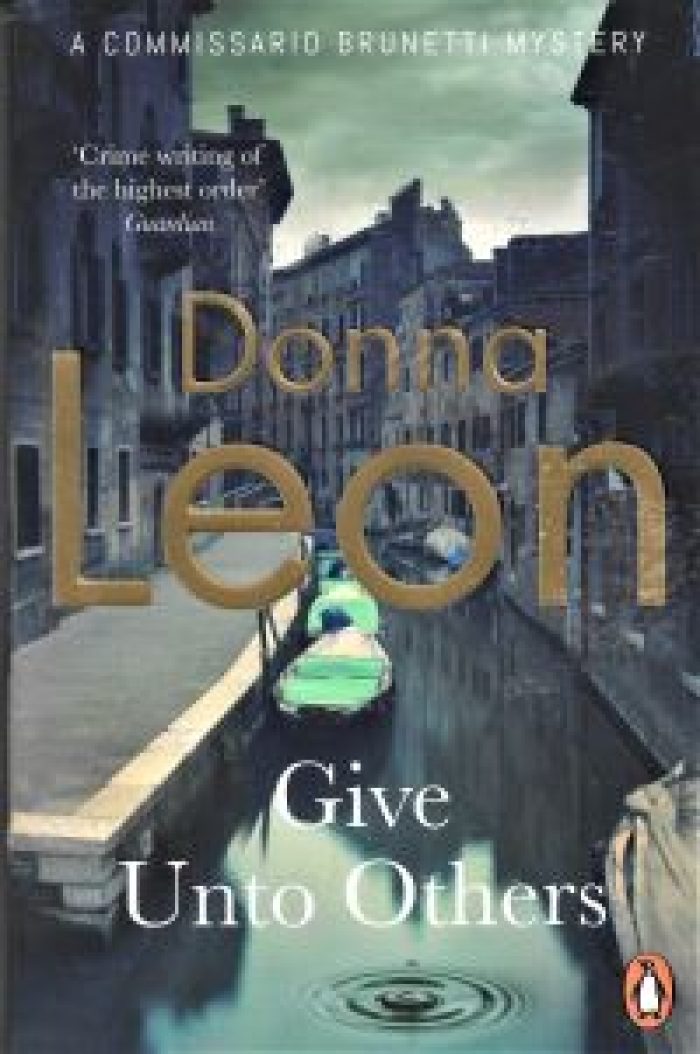There has always been a leisurely air about Guido Brunetti’s approach to crime. In Give Unto Others his creator dips him even deeper into the realm of the soporfic.
Better than a warming cup of camomile tea. More digestible than a tab or two of valerian.
It’s dreamtime in Venice.
Give Unto Others documents the thirty-first case solved by the likeable Venetian detective. It also marks the thirtieth year of author Donna Leon’s prestigious presence on the crime fiction scene.
As a chronicler of Venetian society and a guide to the city, there are few better. She is well versed in the strict and intricately layered formalities of its people. And she appears to have explored every byway of its streets and canals more thoroughly than a Fodor guide.
The quirks and foibles that govern daily life add complexity to her plotlines. The background to each tale is enhanced by detailed observations of such mundane activities as eating, drinking, which canal service goes where, dress codes and even the minutiae of the correct form of address.
All presented in Leon’s impeccable writing, literate and peppered with academic-style references down the centuries. Phrasing and sentences to contemplatee and ponder over.
So much so that the crime often tends to become secondary. An intrusion to the rarely ruffled family life enjoyed by Brunetti, his academic wife Paola, and their teenage son and daughter.
Such harmony, such calm domestic order. So much polite and civilised conversation over scrumptious meals calmly and dutifully home-cooked by Paola during lunch breaks from her work at the university.
All so other worldly. Is this really the Venice of today?
If so, then it is little wonder that Brunetti’s approach to crime – especially in this latest concoction – is rather more leisurely than most of his fictional contemporaries. Almost genteel. An exercise in good manners.
His wife’s direct connections to Venetian gentry once again prove to be a benefit and a hindrance. It gives him guarded entree to the mannered and secretive upper crust that pulls the strings of those who run the city. But it also means he has to negotiate a tricky course of permissions and approvals to access those at the heart of the mystery.
Fortunately Brunetti is well aware “how deeply the impulse towards suspicion sleeps in the marrow of every Italian’s bones.” Shadowy deals, financial manipulation and coded messages are the daily diet beneath the cloak of respectability worn by the upper echelons of business, government and society.
Thus there is acceptance of duplicity wherever Brunetti ventures. It comes, therefore, as no surprise to him, or to the always elegantly groomed Signorina Elettra, secretary to his indolent superior, when they find a listening device secreted in her office.
Suspicion is everywhere. Especially when an elderly scion of a respected family becomes involved with providing financial support to a charity financing the expansion of a clinic into a full-scale hospital in far-off Belize.
Encouraged by a recommended accountant, he makes an initial donation to the charity. Further donations are encouraged, none of them known to his family. Soon he finds himself the public face of a small office handling a steady flow of donations from Venice to the clinic’s charity in the Caribbean.
His shocked family belatedly discovers it is the beaches rather than its public health services that are the reason for their duped relative’s regular “business” trips to Belize.
Brunetti is asked to investigate and put an end to what they see as the dangerous foibles of an old man blissfully unaware of their illegality.
He is prevailed upon to ensure any hint of scandal is assiduously avoided. Public shame would be a far worse penalty than anything the courts could impose.
So begins a case that is off the books – unofficial and restricted to a select few of his associates. That is until he unravels a web of connections extending way beyond the beaches of Belize.
Money laundering, letter bombs, arson, drugs, a bloody incident with a veterinarian, burglaries and the late-life sexual cravings of a senior citizen are slowly revealed as the backdrop to a fractured family’s domestic wranglings.
The likeable Brunetti drifts through it all, taking his time, detouring into all manner of domestic and social issues. Discussions about ancient history over the dinner table. Philosophical debates with his opinionated children. Musings on life in general as he cruises to and fro between crime scenes.
Always time to pause for a coffee and a perusal of the papers.
It’s all very leisurely and mannered. Highly contemplative. Perhaps it is simply a matter of ageing. Brunetti slowing with the passing of the years. A natural process.
Loyal readers could well welcome this meandering pace, their own lives slowing alongside that of their hero. And, like him, almost smug in the certainty that he will ruffle a few feathers along the way but will get there in the end.
Comforting, soothing. Defiitely a book for bedtime.
